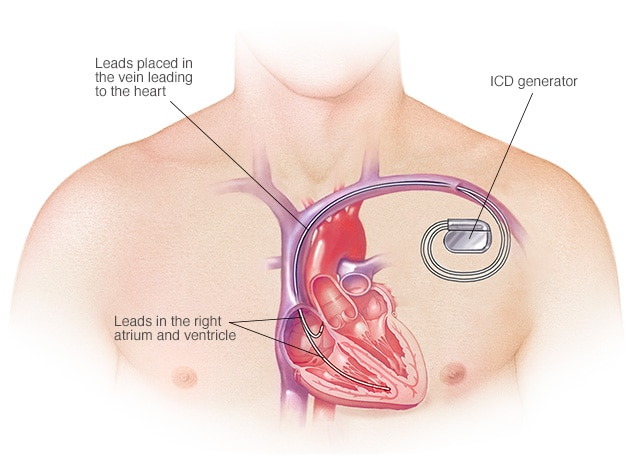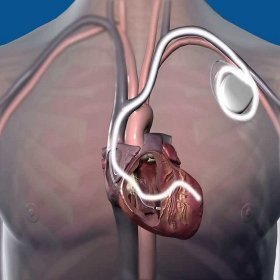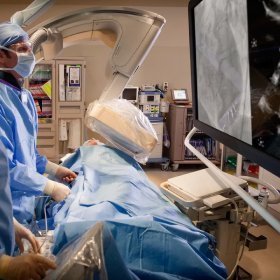Ventricular Tachycardia Treatment

Ventricular Tachycardia (VT) Treatment: Expert Care for a Stable Heartbeat
Ventricular Tachycardia (VT) is a life-threatening heart rhythm disorder characterized by a fast and irregular heartbeat originating from the heart’s lower chambers (ventricles). If left untreated, VT can lead to sudden cardiac arrest or death. Patients with heart failure, structural heart disease, or genetic disorders are at higher risk of developing VT.
Dr. Deep Chandh Raja, a leading cardiac electrophysiologist in Chennai, specializes in diagnosing and treating complex VT cases. With advanced training and state-of-the-art technology, Dr. Raja provides personalized care to restore normal heart rhythm and improve quality of life.
What is Ventricular Tachycardia (VT)?
VT occurs when abnormal electrical signals in the ventricles cause the heart to beat too fast, often exceeding 100 beats per minute. This prevents the heart from pumping blood effectively, leading to symptoms such as:
- Dizziness or lightheadedness
- Rapid or pounding heartbeat (palpitations)
- Shortness of breath
- Chest pain or discomfort
- Loss of consciousness (in severe cases)
Who is at Risk of VT?
Certain conditions and factors increase the risk of VT, including:
- Heart failure (especially with reduced pumping function)
- Previous heart attack or cardiomyopathy
- Genetic disorders such as Long QT syndrome, Brugada syndrome, or Catecholaminergic Polymorphic Ventricular Tachycardia (CPVT)

- Severe Mitral Valve Prolapse (MVP)
- Premature Ventricular Complexes (PVCs) or skipped beats
Why is VT Dangerous?
VT can deteriorate into Ventricular Fibrillation (VF), a chaotic rhythm that stops blood flow to the brain and other vital organs. Without immediate treatment, this can lead to sudden cardiac death.
Diagnosis of Ventricular Tachycardia
Dr. Deep Chandh Raja uses advanced diagnostic tools to accurately identify VT and its underlying causes:
- Electrocardiogram (ECG): Detects abnormal heart rhythms.
- Holter Monitor or Event Monitor: Tracks heart activity over 24-48 hours or longer.
- Echocardiogram: Assesses heart structure and function.
- Electrophysiology Study (EPS): Maps the heart’s electrical activity to pinpoint the source of VT.
Treatment Options for VT
Treating VT involves a personalized approach. Dr. Raja works with heart failure specialists and cardiac electrophysiologists to offer tailored care. Key treatments include:
Medications
Antiarrhythmic drugs or beta-blockers help control heart rhythm and prevent VT episodes.
Implantable Cardioverter-Defibrillator (ICD)
An ICD monitors heart rhythm and delivers an electric shock to restore normal rhythm if VT or VF occurs.
Radiofrequency Ablation (RFA)
A minimally invasive procedure using heat to destroy tissue causing abnormal signals. Dr. Raja specializes in:
- Endocardial VT Ablation: Targets tissue inside the heart.
- Epicardial VT Ablation: Addresses tissue on the heart’s outer surface.
Advanced Technologies
Dr. Raja uses state-of-the-art tools for precision, including:
- 3D Navigation Systems: Maps heart electrical activity.
- Contact Force Catheters: Ensures proper tissue contact during ablation.
- Intracardiac Echocardiography (ICE): Provides real-time imaging.

Get in Touch
Contact Info
Email Address
deepchandh@gmail.com
Kavery Alwarpet
Director of Cardiac Electrophysiology and Senior Consultant in Cardiology.
No: +91 8056204449.
Kavery Vadapalani
Director of Cardiac Electrophysiology and Senior Consultant in Cardiology..
No: +91 9043632236.
Raja Multi-Specialty Clinic
Plot no 1, Nolambur Phase 1, VGN Nagar Phase 1, Nolambur, Ambattur Industrial Estate, Chennai, Tamil Nadu 600037
No : +918608601590
Services

Cardiac Electrophysiology & Heart Rhythm Therapies
Restoring Your Heart’s Natural Rhythm with Advanced Cardiac Electrophysiology
The heart functions through electrical signals that maintain a steady beat. If these signals become irregular, conditions such as atrial fibrillation (AF), supraventricular tachycardia (SVT), and ventricular tachycardia (VT) can occur, leading to discomfort and, in some cases, serious complications.
We specialize in electrophysiology and advanced heart rhythm treatments to regulate and restore normal heart function, improving overall health and quality of life.
Electrophysiology Study (EPS) & Radiofrequency Ablation (RFA)
A Safe & Effective Solution for Irregular Heartbeats
Electrophysiology Study (EPS) is a specialized test that helps assess heart rhythm disorders and identify the best treatment plan. If needed, Radiofrequency Ablation (RFA) is performed to correct irregular electrical signals in the heart, ensuring a steady and healthy rhythm.
Common Symptoms of Heart Rhythm Disorders
- Irregular or rapid heartbeats (palpitations)
- Dizziness, lightheadedness, or fainting episodes
- Unexplained shortness of breath or chest discomfort
- Fatigue or weakness due to poor blood circulation
Why Consider EPS & RFA?
- Helps detect and manage arrhythmias early
- Recommended for individuals experiencing palpitations or unexplained fainting
- Performed using advanced, minimally invasive techniques

Supraventricular Tachycardia (SVT) Ablation
Supraventricular Tachycardia (SVT) causes episodes of sudden, fast heartbeats, which can be uncomfortable and affect daily life. If left untreated, it may increase the risk of heart complications over time.
Who is at Risk for SVT?
- Individuals with stress-related heart palpitations
- People with excess caffeine or alcohol intake
- Patients with underlying heart conditions or electrical disorders
Benefits of SVT Ablation:
- Prevents recurrent palpitations & discomfort
- Improves heart rhythm & reduces stress on the heart
- Enhances quality of life with long-term symptom relief
Ventricular Tachycardia (VT) Ablation
Ventricular Tachycardia (VT) is a fast heart rhythm disorder that may lead to serious health risks, including sudden cardiac arrest. Treatment is essential to prevent life-threatening complications.
- Rapid, irregular heartbeats lasting several seconds or minutes
- Fainting or dizziness without warning
- Chest pain, discomfort, or sudden weakness
Why VT Ablation?
- Helps control dangerous heart rate fluctuations
- Reduces the need for emergency interventions
- Improves heart function and stability

Epicardial Ablation for Complex VT
In some cases, ventricular tachycardia (VT) may require a specialized approach for treatment. Epicardial Ablation is an effective option for complex cases where traditional methods may not be sufficient.
Why Choose Epicardial Ablation?
- Recommended for difficult-to-treat VT cases
- Helps patients with prior unsuccessful treatments
- A tailored approach for long-term heart rhythm stability
Who is at Risk for SVT?
- Individuals with stress-related heart palpitations
- People with excess caffeine or alcohol intake
- Patients with underlying heart conditions or electrical disorders



